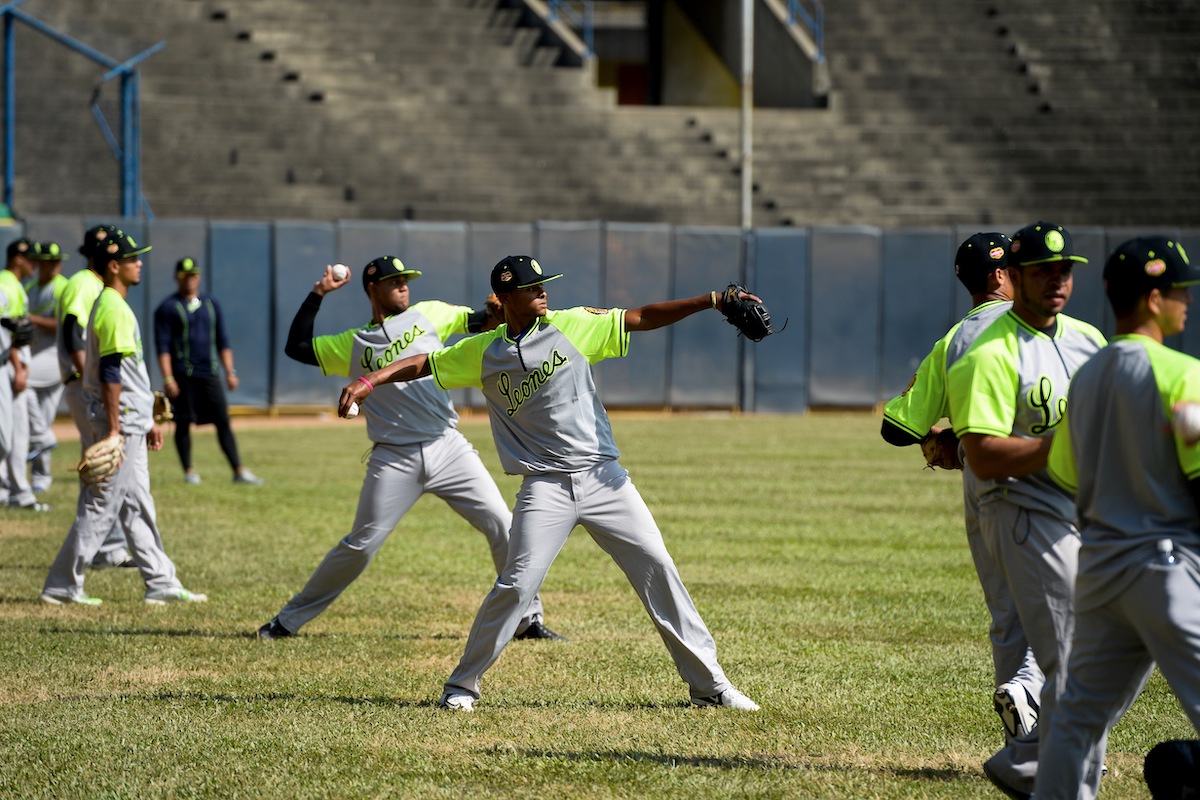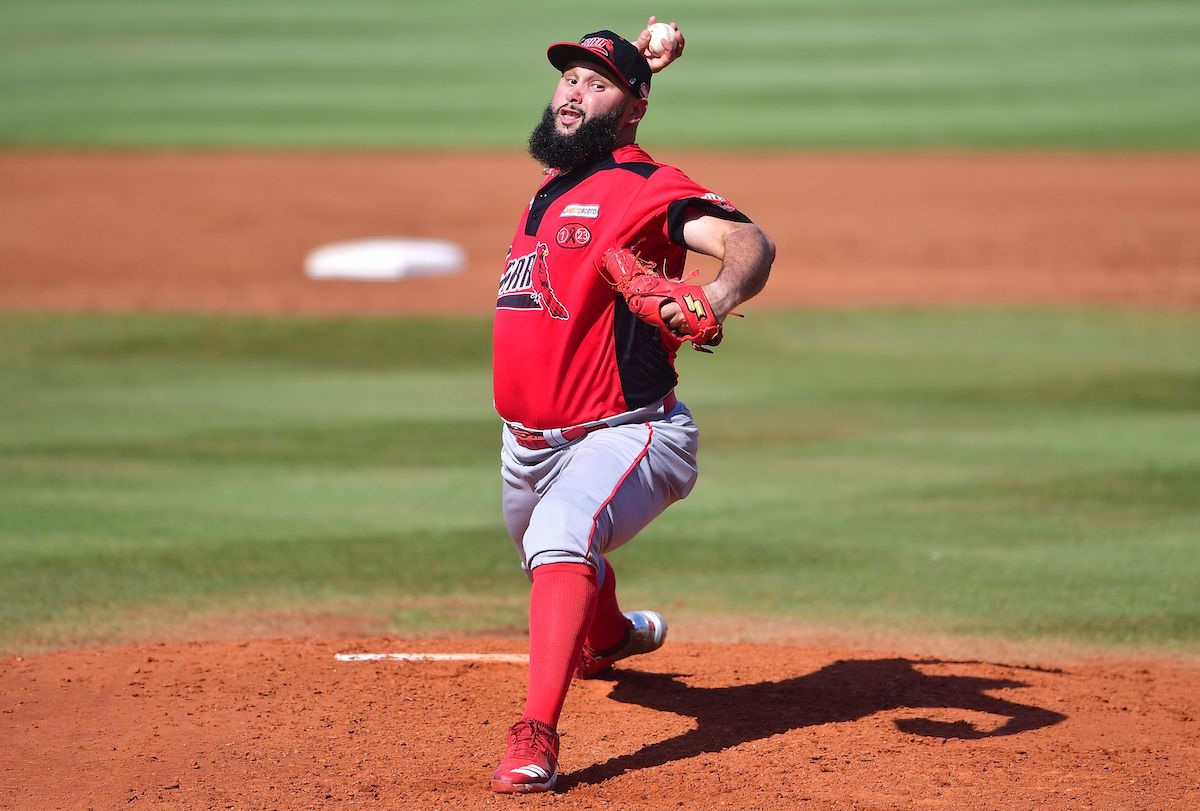

Players of the Venezuelan baseball team Leones del Caracas attend a training session at the Universitario stadium in Caracas, on September 18, 2017. (Photo by FEDERICO PARRA/AFP/Getty Images)
MARACAY, Venezuela — Last week, The Wall Street Journal broke the story that the MLB would prohibit its players from participating in Venezuela’s winter league. This is due to concerns that it could potentially violate the sanctions approved on August 5 by the Trump administration against U.S. companies doing business with the government of Nicolás Maduro.
The ban would also extend to players of Venezuelan origin, which at the start of the current season represents 68 Venezuelans spread across 28 teams—more than players from Cuba, Puerto Rico, Mexico and Japan combined, and second only to the Dominican Republic. The decision also includes the minor leagues, where many players rely on winter leagues in the Caribbean for experience, exposure, and extra income.
So far the Maduro government hasn’t made an official statement, but Venezuela’s pro-government media has been quick to condemn it.
“The MLB is an association of clubs that have work contracts with the players, plus a Collective Bargaining Agreement through the MLB Player Association,” said sports lawyer Antonio Quintero, who spoke to Latino Rebels to provide a better grasp of the situation. “In this sense, the MLB lends its players to the Caribbean leagues under certain conditions established in the Winter League Agreement.”
The Winter League Agreement establishes a unique relation between MLB and the Caribbean Confederation, which is made up by professional leagues from Mexico, Dominican Republic, Puerto Rico and Venezuela.
On Friday, the Confederation released a statement from Commissioner Juan Francisco Puello Herrera, declaring that it was “studying the situation” and that it was a “real shame that politics and sports mix in this way” but that ultimately MLB was simply following the policies of the U.S. government.
According to Quintero, MLB is exempt to fulfill the agreement under the Sovereign Acts Doctrine (in Spanish, “Principio del Hecho del Príncipe”) as it would go against rulings of the U.S. government. However, the question if the league, which is a private association, can be considered part of the Venezuelan government is really “up to the OFAC or the Treasury Department.”
So far the Liga Venezolana de Béisbol Profesional (Venezuelan Professional Baseball League) has not released a formal statement, but this is a major blow. Founded in 1946, the LVBP is currently made up of eight teams in six states plus two in Caracas. The season ranges from October to December, with playoff games in January.


Felipe Paulino of Venezuela’s Cardenales de Lara throws the ball against Cuba’s Leñadores de Las Tunas during the Caribbean Series baseball tournament game at Rod Carew stadium in Panama City on February 9, 2019. (Photo by LUIS ACOSTA/AFP/Getty Images)
However, the league has been going through a rough couple years as the country’s economic and political crisis deepens.
For instance, take the case of the Leones del Caracas, one of the most popular and prestigious LBVP teams with 20 championships and 2 Caribbean Series titles. Last year, ticket prices for the Leones reportedly spiked around 22,400% compared to the previous season. Although absurdly low by international standards (between $1 to $6 for regular seats), those tickets were unattainable for minimum wage earners, who make anywhere between $12 to $17 per month.
Despite the price hike, a 40% attendance drop and an average in attendance of about 6,000 to 7,000 spectators per game (out of a capacity of 25,690), the Leones usually witness the highest attendance of any team in the league.
It’s no surprise then that one week before the season began, Venezuela’s state-owned oil corporation PDVSA made an emergency allocation of $12 million to keep the league afloat. Earlier this year, the LVBP announced that it would cut down the 2019-2020 season from 63 to 42 games, starting on November 5.
In addition, the tragic deaths of Cardenales de Lara players José Castillo and Luis Valbuena last year due to a trap set by carjackers while returning from a game ignited a controversy about players’ safety. MLB academies have closed down its doors, and scouts are no longer visiting the country. The whole structure that once made Venezuela a baseball powerhouse might disappear in a generation.
Baseball in Venezuela has come from a long way. The first baseball club was founded in 1895, and the game grew in popularity in the 20’s and 30’s. The watershed moment came in 1939 when Alejandro Carrasquel became the first Venezuelan in the Major Leagues, pitching for the Washington Senators, and in 1941 when the national team won the Amateur World Series, turning the game into a national obsession.
Although soccer has grown in popularity since the 1990’s, in part due to the support of immigrant communities from Southern Europe and the rest of South America, baseball still remains an essential part of Venezuela. On residential streets, one can still see caimaneras, informal gatherings where neighborhood kids swing broomsticks and pitch bottle caps or balls made of paper and tape, showing that despite everything, the game will continue in some way or another.
***
José González Vargas is a Venezuelan journalist who has written for several outlets, including Latino USA, Latino Rebels, Caracas Chronicles and Into. He tweets from @Maxmordon.



[…] beloved Winter League baseball season opened Tuesday with hundreds of cheering fans converging on the stadium in Caracas and elsewhere […]